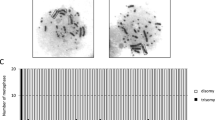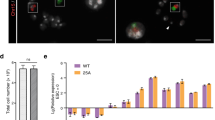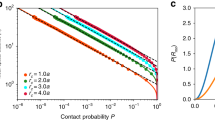Abstract
IT is well established that human cells which are trisomic for chromosome 21 are more sensitive to the antiviral activity of interferon than normal diploid cells1–6. If chromosome 21 codes for an interferon receptor site localised at the cell surface, as suggested4,5, one might expect cellular binding of interferon to increase in the order mono-somic 21 cells, disomic 21 cells and trisomic 21 cells. This did not prove to be the case. All cell types bound interferon equally well. In view of these and previously5 reported data, it is postulated that chromosome 21, if it codes for a protein involved in the interferon response of the cells, does not specify the receptor molecule per se but another molecule that is involved in the processing of the antiviral message from the cell surface to the interior of the cell.
This is a preview of subscription content, access via your institution
Access options
Subscribe to this journal
Receive 51 print issues and online access
$199.00 per year
only $3.90 per issue
Buy this article
- Purchase on Springer Link
- Instant access to full article PDF
Prices may be subject to local taxes which are calculated during checkout
Similar content being viewed by others
References
Tan, Y. H., Schneider, E. L., Tischfield, J., Epstein, C. J., and Ruddle, F. H., Science, 186, 61–63 (1974).
Tan, Y. H., Nature, 253, 280–282 (1975).
De Clercq, E., Edy, V. G., and Cassiman, J.-J., Nature, 256, 132–134 (1975).
Chany, C., et al., Proc. natn. Acad. Sci. U.S.A., 72, 3129–3133 (1975).
Revel, M., Bash, D., and Ruddle, F. H., Nature, 260, 139–141 (1976).
Epstein, L. B., and Epstein, C. J., J. infect. Dis., 133 (suppl.), A56–A62 (1976).
Ankel, H., Chany, C., Galliot, B., Chevalier, M. J., and Robert, M., Proc. natn. Acad. Sci. U.S.A., 70, 2360–2363 (1973).
Chany, C., Ankel, H., Galliot, B., Chevalier, M. J., and Gregoire, A., Proc. Soc. exp. Biol. Med., 147, 293–299 (1974).
Knight, E., Jr, Biochem. biophys. Res. Commun., 56, 860–864 (1974).
Knight, E., Jr, J. gen. Virol., 25, 143–145 (1974).
Stewart, W. E., II, De Clercq, E., and De Somer, P., J. Virol., 10, 707–712 (1972).
Berman, B., and Vilcek, J., Virology, 57, 378–386 (1974).
Gresser, I., Bandu, M.-T., and Brouty-Boyé, D., J. natn. Cancer Inst., 52, 553–559 (1974).
Tan, Y. H., Chou, E. L., and Lundh, N., Nature, 257, 310–312 (1975).
Dianzani, F., and Baron, S., Nature, 257, 682–684 (1975).
Author information
Authors and Affiliations
Rights and permissions
About this article
Cite this article
DE CLERCQ, E., EDY, V. & CASSIMAN, JJ. Chromosome 21 does not code for an interferon receptor. Nature 264, 249–251 (1976). https://doi.org/10.1038/264249a0
Received:
Accepted:
Issue Date:
DOI: https://doi.org/10.1038/264249a0
This article is cited by
Comments
By submitting a comment you agree to abide by our Terms and Community Guidelines. If you find something abusive or that does not comply with our terms or guidelines please flag it as inappropriate.



